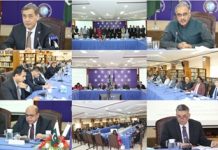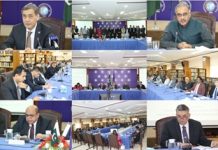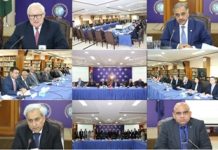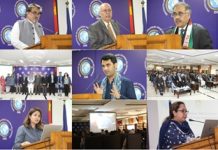The question of social change and modern rational attitudes of tolerance of difference is a long-term process, but we must set ourselves on this long journey by investing more in social development and by making calculated interventions through law and public policy into the structures of the rural area
Extremism, intolerance, violence. These are not just words, they depict a cruel reality that has come to characterise our society today. Every Pakistani is perturbed by the negative images that pervade local and foreign media about Pakistan. The government and its functionaries don’t like negative commentary, and often dismiss it without giving any serious thought to it. While it is clear that the rulers have a personal-political stake in cultivating a positive image of Pakistan, it is important to recognise that the country has a serious image problem abroad which prevents foreign investors, researchers and tourists from visiting our country and cannot be reversed through dissembling.
The question is: can we hide the facts about what exactly is happening in our society? Will the world community and more aware sections of our society trust and rely on the artificial, unreal makeover through media and other official channels?
No. There is need for reflection and honest debate at various levels, but especially in and through the media and parliament. If there are parliamentarians with any capacity to think beyond their immediate personal interest, and engage seriously about extremism and violence in our society, they must take up this challenge.
Another forum for healthy debates are academic institutions (colleges and universities). But in the case especially of public-sector institutions, the students have been indoctrinated by the student-wings of religio-political parties. They are funded and supported by these parties and they have turned these institutions into fascist fiefdoms. For the past three decades, they have virtually controlled public universities to promote their particular worldview, to the extent that they can force the faculty and students to either conform or leave.
With universities one associates critical inquiry, rational debate, dissent, and creative thinking, not conformity. But that is exactly what has happened to our universities. Interestingly, while much of the debate nowadays is focused on madrassas though there are good reasons for that we have ignored the quality of graduates our universities and colleges have produced over the past thirty years. The situation has hardly changed. It is these people who have gone into the bureaucracy, politics, business, media and other vital institutions of the state and society. Tolerance religious, ideological, and academic never has been the value or virtue defended or promoted in the universities.
If our society is largely intolerant towards differing viewpoints it is because we have failed to develop educational institutions that put premium on free debate and inquiry. To think that the situation may be changing under the slogan of “enlightened moderation” is to show misplaced optimism.
I am focusing more on modern institutions than on other factors for obvious reason: the primary function and the historical identity of the academy is associated with the training of the free-thinking, rational, tolerant and open individual that develops himself and becomes socially relevant and useful by accepting pluralism and regarding the clash of ideas as essential to the development of values. I think our graduates, as well as the majority of those who are imparting them knowledge, lack these essential qualities of the modern man.
Let me also discuss briefly two other reasons for growth of extremism and violence. The first is the worsening quality of governance at all levels. Contrary to official claims, our system of governance at all levels has deteriorated. There are so many elegant philosophical and political debates, mainly in Western societies, about the purposes of government. These debates are open to everyone, and are part of the collective human heritage. Our rulers will greatly benefit by opening some pages of literature on why government was created.
The first principle relates to law and order. It is the primary responsibility of the government. Our record on that count needs no reiteration. Most questions about law and order become centred on the fundamental rights of the individual life, property, and in the Lockean sense, the pursuit of liberty. Property rights are poorly enforced; life, if not short and brutish, is uncertain and problematic in terms of its fullness and self-actualisation; and liberty is hostage to tradition, conservative religious values and a hybrid of feudal-military authoritarianism. The combination of these forces over time has created an intolerant society. This is because all elements of the iron triangle mullah, military and the feudals by their class interests and organisational culture seek conformity and punish dissent.
I believe we need to look at socialisation and the culture of our ruling elites to understand why the state and society view violence against women, religious minorities, and any radicalism in thought and practice with a great deal of permissiveness. Our debate about the failure of the state in dealing with religious, ethnic and sectarian violence often revolves around its capacities. That is true, but not enough of an explanation. The general mindset of the three major groups that I have referred to above and their attitudes, values and orientation towards violence need to be looked at closely to understand the ineffectiveness of the government.
Is our society any better when it comes to violence against women and other weaker groups? Not really. A feeling of permissiveness travels from top-down, from the elites to the masses. An agrarian social structure, a strong imprint of religious orthodoxy, and the slow pace of modernity and social change are the main reasons of this.
But above all it is the growing numbers of men and women who think it is their primary religious duty to make other Muslims believe and behave like them. They are possessed with an artificial sense of certitude and authenticity. Since they are on the right path, they must influence others’ religious and social choices. A good number of them, like the serial killer of women, Mullah Sarwar have become self-appointed soldiers of God, His judges and executioners. We have noticed and recorded only a fraction of such crime. Violence motivated by sectarian considerations is too widespread and takes many forms of humiliation, physical assault and target killings of prominent religious scholars, professionals and community leaders of rival sects.
I believe religion has a great value in answering questions about the mystery of existence and giving a positive and purposive direction to a person’s life. But we cannot rely on religion alone to create a peaceful, orderly and tolerant society. An individual motivated by greed, ambitions and lust for power cannot be tamed by religious values alone. This role has to be played by the state through its strong arm of law. But then, law cannot be strong enough without the rule of law. Here we are back to the basics.
Never will intolerance and violence disappear from our society with sermons, speeches and florid statement of our leaders. We must start a reform process in governance and the educational system. This is doable in the short term. The question of social change and modern rational attitudes of tolerance of difference is a long-term process, but we must set ourselves on this long journey by investing more in social development and by making calculated interventions through law and public policy into the structures of the rural areas.
The author is a professor of Political Science at the Lahore University of Management Sciences.













